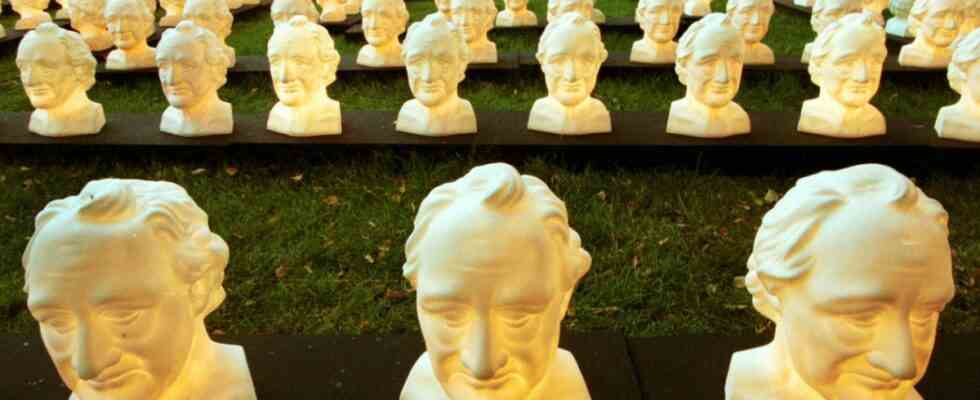When Rüdiger Safranski published his biography of Goethe ten years ago, he gave it the subtitle “Artwork of Life”. It is true that literary works were also mentioned in this book. But the focus was on a “second work” of the poet: on the shaping of his own existence, in which Goethe is said to have succeeded in a similarly masterly way as in literature.
The significance of the artist’s oeuvre remained subordinate: it formed the basis under which this life was remarkable at all. And the author of the biography could rely on his audience knowing this meaning: The “Sorrows of Young Werther” and the “Elective Affinities”, “Iphigenia” and “Faust” remained unread or unseen in the worst case. But people knew that this work existed, and both the poet and the work were admired, which apparently had been able to spread and pass on without much specialist knowledge.
Another biography of Goethe was published last autumn, written by Jeremy Adler, a British literary historian. It is subtitled “The Invention of Modernity”. A lot has already been “invented” in the book titles of the past few years, “nature” (Andrea Wulf), “creativity” (Andreas Reckwitz), the “political” (Ulrich Beck) or “Russia” (Boris Groys), not to mention the “housewife” (Evke Rulffes) or the “facing stone” (Wilko Potgeter). But you understand what is meant: That something was created out of nothing a long time ago that has more or less great significance for the present.
Goethe, Jeremy Adler seems to believe, has lost his posterity
An “invention” requires little, least of all for the audience, who should first be informed about how useful a figure from the past was for today’s conditions. The subtitle of this book contains information about what is supposed to have happened in the fourteen years since Safranski’s biography: Goethe, the author and publisher seem to think, has lost his posterity. A new period must therefore be created. For a specialist in literary history with a focus on Goethe, this is a bad finding. Because he turns against the specialist himself, against the object of his interest and against his profession.
Jeremy Adler is serious about the “invention of modernity”https://www.sueddeutsche.de/kultur/.”Goethe’s model of the spiral nature of life anticipates the structure of the double helix,” explains the biographer. In addition, “it will be necessary to grant Goethe a leading role in the development of modern physics.” The poet is said to have made “a unique contribution to the history of music,” anticipating ideas of “human capital” or “cultural capital” and preparing “modern social sciences.”
Sometimes Jeremy Adler explains Goethe’s deeds and works, for example when it comes to the poet’s encounter with Napoleon or his enthusiasm for spa stays or the influence of the British early socialist Robert Owen on the end of “Faust”, part two. Then the book gets interesting. Often, however, he only calls witnesses to Goethe’s importance, primarily from Anglo-Saxon intellectual history.
Jeremy Adler: Goethe. The invention of modernity. A biography. Translated from the English by Michael Bischoff. Revised and expanded version based on the translation. CH Beck Verlag, Munich 2022. 656 pages, 34 euros.
(Photo: CHBeck)
What emerges in this way are not explanations, but rather long chains of names that themselves need explanation: “Just as Goethe gave essential impulses to modern sociology – Durkheim, Spencer, Simmel, Webb, Weber, Bourdieu – so his body of thought struck a chord in politics low.” Sometimes the chains break, for example with the assertion that liberalism began with Goethe. It is based on confusing the appreciation that Goethe had for the individual with a political philosophy. Such speculations are also based on the attempt to make an object interesting that apparently is no longer interesting on its own.
Jeremy Adler originally wrote this book for an Anglo-Saxon audience that knew little or nothing about Goethe. The original, with a size of 250 small, airy printed pages, was published as part of the series “Critical Lives” by the publishing company Reaction Books, as a paperback and designed in the manner of the “Rowohlt monographs”. In such a context, the book fulfills its purpose, and the reader endures the pompous emptiness of sentences such as “Goethe changed the face of the world through the power of his genius” or “What is special about Goethe’s poetry is the lyrical dimension”, because it is more than that anyway what matters is initial orientation and the establishment of abstract size than intellectual penetration of the object.
The same sentences make a different impression when published in a bound edition that has been expanded by four hundred pages and has all the attributes of academic seriousness. He is deeply unhappy, and the reader wishes the author back the closeness to his subject that he seems to have had before someone suggested to him that he wanted to save a dying world with the thesis that it was useful to “modernity”.

